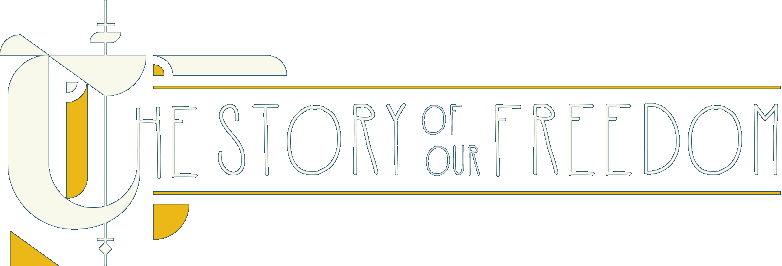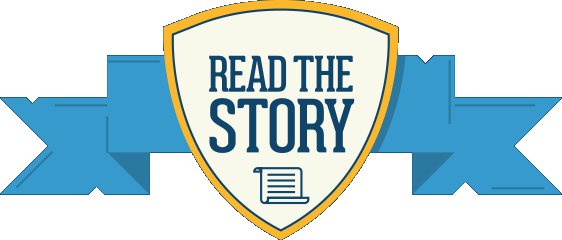The Story of Our Freedom.
Back in the bad ol' days...
The King Is above the law
King John is a cruel tyrant who ignored the laws of the land and the wishes of his subjects. He was often called the “Worst King of Englnd”!
King John is always going to war with France (and always losing!). He keeps taxing the Barons to pay for his armies, until one day they’ve had enough. They march to the fields of Runnymede, near London, and force him to sign Magna Carta.
1215
Magna Carta
This document guarantees Barons their ancient rights:
- No new taxes unless a common counsel agrees
- All free men have the right to justice and a fair trial with a jury
- The Monarch doesn’t have absolute power. The Law is above all men and applies to everyone equally
- All free citizens can own and inherit property
- Widows who own property don’t have to remarry
The one document puts into writing four huge ideas:
Limits on government
The idea that a government can only govern so long as it has the agreement and support of the people
The Rule of Law
The idea that all people and institutions are subject to and accountable to laws
Justice
The idea that the justice system should treat everyone fairly and equally
Mid 1600s
Some people just don’t learn. King Charles the First starts behaving a lot like King John and imposing taxes without consent. If people didn’t pay their taxes, they went to jail.
Eventually this leads to a civil war... and to Charles losing his head.
The Age of Enlightenment begins and some clever thinkers come up with new ideas.
These thinkers question the power of the kings and churches, and argue in favour of individuals and democracy instead.
Probably the most influential of all is John Locke (1632 - 1704) He’s a pioneer of modern thinking. He believes in "Natural Rights", rights ALL people should have, just because they’re people
1679
Habeas Corpus
Drawing on the ancient rights in the Magna Carta, the Parliament of England passes the Habeas Corpus Act in 1679. This protects against locking people up unfairly
1689
English Bill of Rights
The Parliament then went on to pass the English Bill of Rights in 1689 which, like Magna Carta, laid out rules restricting the power of the monarch and protecting the individual rights of the people.
News travels slowly in these times, but over the seas in America, people quite like the idea of having individual rights. The new American colonies decide to take some of the ideas in the Magna Carta and turn them into their own laws.
1765
American Revolution
However, King George III starts to behave a bit like King John and decides to tax the 13 American colonies without their consent. Bad move. The colonies reject British rule and come together to overthrow the authority of Great Britain.
1776
Declaration of Independence
The colonies decide to form a new nation—the United States of America. They announce this in the United States Declaration of Independence. But the Declaration was not just about independence from Britain.
It also recognised that all men were free and equal.
The Americans decide to set up a system of government that made sure that no one person could have all the power. They create a Constitution that divided power between the three main branches, the Congress, the President and the Courts. This means that there are checks and balances in place so that people’s rights are protected.
Meanwhile on the other side of the world
Captain Cook claims Australia - the Great Southern Land - for England. The English bring their laws and ideas about individual rights and freedoms with them to Australia. Not that this helped many people, as most of the English arrivals are convicts and have limited rights. And Aboriginal and Torres Strait Islander people aren’t given any rights at all!
The British learnt from their mistakes in America and allow the Australian colonies to set up their own parliaments and govern themselves.
At the beginning on the 20th century, the colonies get together and decide they need a government for the whole country...
In 1901, the six Australian colonies came together and created the Australian Constitution, a document which established Australia as an independent nation and set up a national Parliament. But still not everyone is treated equally by the law in this new Australia.
1914
World War 1
Then we had one terrible war.
1945
World War 2
And then we had another
Millions of people are killed simply because of who they are, or what they think, or what they believe.
After more than 60 million people lose their lives in World War II it is clear that nations must work together to protect the rights of all human beings.
In 1945 an international organisation is formed by 51 countries committed to preserving peace through international cooperation and collective security. This is the United Nations.
Australia is a founding member of the UN and plays a prominent role in the drafting of the Universal Declaration of Human Rights
1948 - The Universal Declaration of Human Rights.
Unlike all the Declarations, Bills and charters that came before it, the 1948: The Universal Declaration of Human Rights is concerned with everyone on the planet - not just citizens of a single nation or empire.
But what does this all mean for us today?
It means that we can’t take our rights and freedoms for granted. It took a long time to get them and many people fought hard for them.
Today, we have …
Freedom of speech – we exercise our freedom of speech whenever we text, tweet, blog or make any other social post
The right to vote – once over 18, we can exercise our right to vote in elections and decide the future of our country
Right to worship – we can decide whether we follow a religion, or not, and worship how we choose
The right to fair trial – we cannot be locked up by the people in power without a fair and independent trial.
However, even today these rights are not always protected equally for everyone...
In the world, some people are still treated unfairly because of their race, nationality, gender, sexuality or their age.
Some people experience violence or bullying.
So what can we do?
There’s not just one way to defend and improve our rights, it’s a job for everyone.


